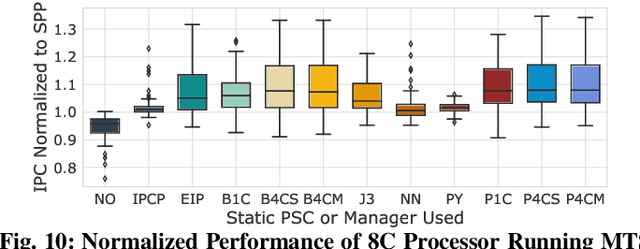Jose L. Abellan
NeuraChip: Accelerating GNN Computations with a Hash-based Decoupled Spatial Accelerator
Apr 26, 2024Abstract:Graph Neural Networks (GNNs) are emerging as a formidable tool for processing non-euclidean data across various domains, ranging from social network analysis to bioinformatics. Despite their effectiveness, their adoption has not been pervasive because of scalability challenges associated with large-scale graph datasets, particularly when leveraging message passing. To tackle these challenges, we introduce NeuraChip, a novel GNN spatial accelerator based on Gustavson's algorithm. NeuraChip decouples the multiplication and addition computations in sparse matrix multiplication. This separation allows for independent exploitation of their unique data dependencies, facilitating efficient resource allocation. We introduce a rolling eviction strategy to mitigate data idling in on-chip memory as well as address the prevalent issue of memory bloat in sparse graph computations. Furthermore, the compute resource load balancing is achieved through a dynamic reseeding hash-based mapping, ensuring uniform utilization of computing resources agnostic of sparsity patterns. Finally, we present NeuraSim, an open-source, cycle-accurate, multi-threaded, modular simulator for comprehensive performance analysis. Overall, NeuraChip presents a significant improvement, yielding an average speedup of 22.1x over Intel's MKL, 17.1x over NVIDIA's cuSPARSE, 16.7x over AMD's hipSPARSE, and 1.5x over prior state-of-the-art SpGEMM accelerator and 1.3x over GNN accelerator. The source code for our open-sourced simulator and performance visualizer is publicly accessible on GitHub https://neurachip.us
Puppeteer: A Random Forest-based Manager for Hardware Prefetchers across the Memory Hierarchy
Jan 28, 2022



Abstract:Over the years, processor throughput has steadily increased. However, the memory throughput has not increased at the same rate, which has led to the memory wall problem in turn increasing the gap between effective and theoretical peak processor performance. To cope with this, there has been an abundance of work in the area of data/instruction prefetcher designs. Broadly, prefetchers predict future data/instruction address accesses and proactively fetch data/instructions in the memory hierarchy with the goal of lowering data/instruction access latency. To this end, one or more prefetchers are deployed at each level of the memory hierarchy, but typically, each prefetcher gets designed in isolation without comprehensively accounting for other prefetchers in the system. As a result, individual prefetchers do not always complement each other, and that leads to lower average performance gains and/or many negative outliers. In this work, we propose Puppeteer, which is a hardware prefetcher manager that uses a suite of random forest regressors to determine at runtime which prefetcher should be ON at each level in the memory hierarchy, such that the prefetchers complement each other and we reduce the data/instruction access latency. Compared to a design with no prefetchers, using Puppeteer we improve IPC by 46.0% in 1 Core (1C), 25.8% in 4 Core (4C), and 11.9% in 8 Core (8C) processors on average across traces generated from SPEC2017, SPEC2006, and Cloud suites with ~10KB overhead. Moreover, we also reduce the number of negative outliers by over 89%, and the performance loss of the worst-case negative outlier from 25% to only 5% compared to the state-of-the-art.
 Add to Chrome
Add to Chrome Add to Firefox
Add to Firefox Add to Edge
Add to Edge